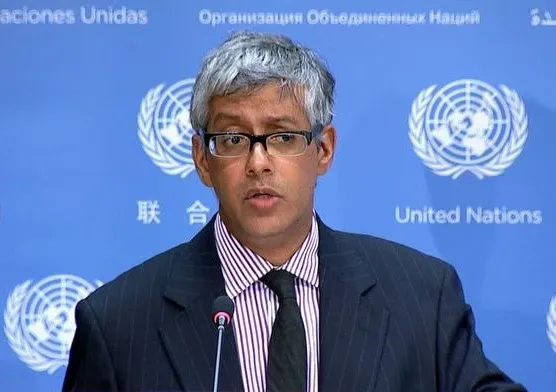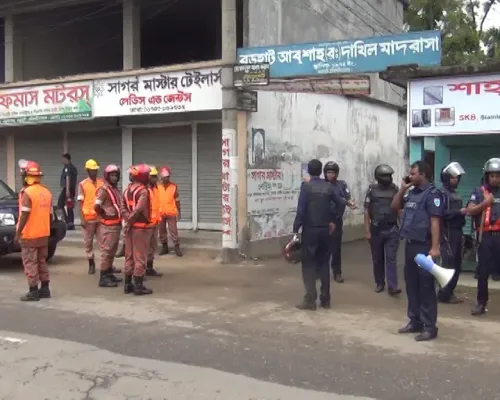Are Drone Strikes in Port Sudan Jeopardizing Humanitarian Operations?

Synopsis
Key Takeaways
- Drone strikes in Port Sudan are escalating.
- The UN has paused aid flights due to safety concerns.
- Power outages are disrupting civilian life.
- Urgent international support is needed to address the humanitarian crisis.
- Thousands of refugees are fleeing to neighboring Chad.
United Nations, May 7 (NationPress) - The surge in drone strikes within the Port Sudan region, which serves as a vital humanitarian aid center for Sudan, poses escalating threats to the distribution of aid, according to a UN representative.
Farhan Haq, the deputy spokesperson for UN Secretary-General Antonio Guterres, stated, "Our humanitarian colleagues have expressed profound concern regarding the escalating drone strikes targeting civilian structures in Port Sudan, located in the eastern part of the nation." These attacks have necessitated at least a temporary suspension of aid flights.
Reports indicate that drone strikes on Tuesday impacted the airport vicinity, a fuel depot, and a power transformer, though no UN personnel or facilities were directly harmed, as reported by the Xinhua news agency.
While no group has officially taken responsibility for the strikes, the Sudanese military has attributed the attacks to the rebel paramilitary organization, the Rapid Support Forces, which began conducting drone operations on Sunday.
Haq pointed out that the UN Office for the Coordination of Humanitarian Affairs (OCHA) has indicated that the recent violence heightens risks for humanitarian workers and operations, resulting in a halt of UN Humanitarian Air Service flights to and from Port Sudan.
He also noted that prolonged power outages have resulted from drone strikes targeting power stations and other facilities throughout Sudan, severely disrupting civilian life.
"In Northern State, a month-long power outage has prevented farmers from operating electrical water pumps, leading to the loss of over 84 square kilometers of crops," Haq stated. "In River Nile State, the targeted destruction of power infrastructure has caused significant water supply shortages."
Despite the ongoing violence, the United Nations remains committed to assisting the most vulnerable populations. In East Darfur, humanitarian organizations have mobilized support for 35,000 individuals in the town of Ed Daein who fled from Khartoum and Al Jazirah states.
Another imminent threat looms for the displaced individuals in Sudan.
"We are enhancing our efforts in water, sanitation, hygiene, and public health outreach to prevent the spread of hepatitis E, which has been identified in Kassala State," the spokesman added.
In neighboring Chad, the UN Refugee Agency (UNHCR) expresses grave concern over the rapidly rising number of Sudanese refugees crossing into eastern Chad, with nearly 20,000 individuals—predominantly women and children—arriving in just the past two weeks.
"This sudden surge reflects the escalating violence in Sudan's North Darfur region, particularly around El Fasher, which is causing mass displacement," the UNHCR reported. "Refugees arriving in Chad have indicated that over 10,000 individuals remain en route, attempting to reach the border to escape the violence."
A rapid protection assessment conducted by UNHCR and its partners revealed that 76 percent of the newly arrived refugees have experienced severe protection incidents, including extortion, theft, and sexual violence.
The agency highlighted that Chad is already hosting 1.3 million refugees, including 794,000 arrivals from Sudan since the conflict escalated over two years ago. While the nation continues to demonstrate remarkable solidarity in accommodating refugees, it cannot shoulder this burden alone.
The UNHCR calls on the international community to urgently amplify support for the response. Currently, only 20 percent of the $409 million required to address the refugee crisis in Chad has been funded.









